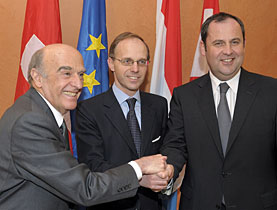
Cornered finance ministers offer dialogue

Switzerland, Austria and Luxembourg have put their heads together in an attempt to avoid the ignominy of featuring on an international tax fraud blacklist.
On Sunday evening, the weather in Luxembourg was damp and foggy – and so too the outcome of the meeting between the three finance ministers: host Luc Frieden of Luxembourg, Switzerland’s Hans-Rudolf Merz and Josef Pröll from Austria.
At a media conference at Senningen Castle, the ministers stressed that banking secrecy had to be defended.
“The Swiss government decided on March 6 that bank secrecy will stay intact but also that cooperation would improve regarding tax offences,” said Merz, offering a promise of dialogue to Switzerland’s critics.
Peter V Kunz, a business law professor at Bern University, said Merz was making a “political statement”.
“He has to find middle ground between the international community and Swiss politics,” Kunz told swissinfo on Monday.
Underlying Merz’s remarks, aimed at his home audience, was this subtext: the three tax havens were willing to talk about how they could better tackle tax crimes. As to what kinds of reforms the three countries are open to, the finance ministers said they were open to ideas.
Last week the British ambassador to Switzerland said the alpine country would not end up on a tax blacklist drawn up by the Organisation for Economic Co-operation and Development (OECD).
But John Nichols told swissinfo that Switzerland’s government had underestimated the external political pressure that the 75-year-old tradition has drawn.
“Not acceptable”
Merz says he wants assurances that Switzerland will not end up on a blacklist – a potential outcome of the G20 summit on April 2, a gathering of the world’s 20 leading economies. Switzerland was not invited.
Frieden of Luxembourg said he wanted dialogue also. “It is not acceptable to talk about us without talking to us,” he said.
One possible concession to the G20 is that Switzerland, Austria and Luxembourg would accept banking secrecy conventions set out by the OECD, a 30-member group containing most of the world’s developed economies.
The proposal would have countries like Switzerland cooperate not only on the issue of tax fraud but also cases of evasion, as well as providing legal assistance.
This would mean that Germany for example could ask whether one of its citizens held a bank account in Switzerland if it had grounds to suspect tax evasion, at present not a criminal offence in Switzerland.
“Political hardball”
“The exchange of information will be a possibility, but there will be many others,” Merz said. He did not elaborate. After the media conference, the finance ministers continued their talks behind closed doors.
Most EU countries already provide each other with data on bank customers automatically. Austria and Luxembourg do not, and Kunz says it would be unlikely the EU would ask Switzerland to live up to standards that are inconsistent even within the 27-country organisation.
Currently, Switzerland collects a withholding tax on non-citizens.
Kunz says a withholding tax is a “good offer” and might well be a solution the US could agree to. Even though the three finance chiefs were short on specifics on Sunday evening, they stressed an aversion to any kind of blanket policy.
“Our goal is that an automatic exchange of information should be avoided because this would be the end of bank secrecy,” said Merz.
“An automatic exchange would not fly in Switzerland at all,” said Kunz, but noted that Switzerland held little leverage.
“If political hardball is played, it can do nothing,” he said.
swissinfo, Justin Häne and Simon Thönen
People wishing to dodge paying taxes on their assets can do so by three means: avoidance, evasion and fraud.
Avoidance is the legitimate means of structuring finances so they don’t fall under the scope of taxable assets. This can be done, for example, by setting up a trust fund or by changing country residence or nationality.
Evasion is the deliberate concealing the true state of assets from the tax authorities – in other words, lying about the extent of your assets. This is a civil offence in Switzerland and some other countries, such as Austria and Liechtenstein, but criminal in most states.
The main distinction between evasion and fraud is that the perpetrator tells lies on official documentation. Unless tax fraud can be proved, Swiss banks are not obliged to hand over details of client assets to investigators. In some cases this information is needed before fraud can be established in the first place.
It’s strongly associated with the image of Switzerland. In literature or on the big screen, it’s never far away; think of James Bond, for example.
But banking secrecy is far from being a simply Swiss phenomenon.
The European Commission is also targeting Belgium, Luxembourg and Austria.
The Organisation for Economic Co-operation and Development also considers that Andorra and Monaco are non-cooperative tax havens, whereas Liechtenstein has cooperated with the EU since last year.
Britain and the US: Banking secrecy is limited but the two countries do have territories where it is less restrictive – for example Jersey, the Isle of Man, the Bahamas and the Cayman Islands.
Singapore has drafted plans in the general direction of the OECD. But when it comes to Hong Kong, China is deaf to EU demands for more transparency.

In compliance with the JTI standards
More: SWI swissinfo.ch certified by the Journalism Trust Initiative




























You can find an overview of ongoing debates with our journalists here . Please join us!
If you want to start a conversation about a topic raised in this article or want to report factual errors, email us at english@swissinfo.ch.